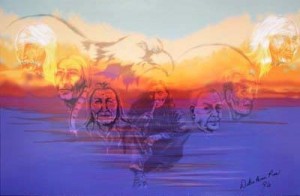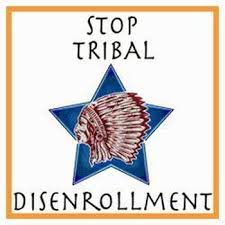It is with great admiration for my colleague Professor Duane Champagne that I must disagree with some of the underpinnings to his recent column, “The Debate Over Disenrollment.” Here, I hope to help reframe that “debate."
Professor Champagne suggests, like legions of others, that the 1978 Santa Clara v. Martinez bestows upon tribal governments some form of absolute power to disenroll Indians. Most notably the U.S. Department of Interior has proclaimed, time and again, that Santa Clara requires “‘a proper respect’ for tribal sovereignty” and “‘cautions’ that [the Fed] tread lightly” in the realm of disenrollment, even in the face of related federal illegality. Reliance on Santa Clara is outdated, and frankly, unhelpful in the face of what Professor David Wilkins rightly calls a “disenrollment epidemic.”
 Although Professor Champagne is correct that federal courts generally “do not have jurisdiction over tribal membership rules,” they do have jurisdiction over various Tribal disenrollment-related actions that implicate federal law and thus raise federal questions under 28 U.S.C. 1331. For example, the trend of faction-driven Secretarial elections that further the targeted disenrollment of Indians under the guise of the federal Indian Reorganization Act, implicates the federal judiciary’s jurisdiction. Likewise, the trend of denying proposed disenrollees tribally and federally guaranteed equal rights, such as gaming per capita distributions, implicates the federal Indian Gaming Regulatory Act.
Although Professor Champagne is correct that federal courts generally “do not have jurisdiction over tribal membership rules,” they do have jurisdiction over various Tribal disenrollment-related actions that implicate federal law and thus raise federal questions under 28 U.S.C. 1331. For example, the trend of faction-driven Secretarial elections that further the targeted disenrollment of Indians under the guise of the federal Indian Reorganization Act, implicates the federal judiciary’s jurisdiction. Likewise, the trend of denying proposed disenrollees tribally and federally guaranteed equal rights, such as gaming per capita distributions, implicates the federal Indian Gaming Regulatory Act.
It is only a matter of time before federal judges, in the spirit of judicial realism, begin to tackle disenrollment on the merits. A recent Ninth Circuit Court of Appeals panel recently commented that “membership disputes have been proliferating in recent years, largely driven by the advent of Indian gaming, the revenues from which are distributed among tribal members.” Alto v. Black (9th Cir. 2013). Reading between the lines: the federal courts are tired of per capita-driven mass disenrollment disputes. The United States' judges will eventually intercede to help put a stop to those disputes' proliferation, with the judges' hook being the rampant federal civil rights violations that accompany any mass Indian disenrollment.
Professor Champagne suggests that “[o]ften Indian disenrollment debates focus on specific membership rules particular to a given tribe, such as their traditional kinship system[s].” The reality, though, is that trending mass tribal disenrollment efforts have little to do with tribal tradition-based membership requirements. They instead involve artificial, federal membership constructs, like U.S. censuses and rolls, which can be “traced to the United States’ paternalistic assimilation policies of the 1930s.” As Dr. Jay Miller observes, “no census was fully effective and portions of tribes were always missing both by accident and by malicious intent of U.S. or tribal officials.”
Disenrollments rooted in such non-indigenous constructs really do not “require deep understanding of tribal community, history, culture, and identity” as the professor suggests. In fact, disenrollment typically has little to nothing to do with such Indian ideals. Disenrollment is “predominately about race, and money.” Even if a particular disenrollment dispute is not driven by those non-indigenous values—I do not know of one mass disenrollment that is not—“non-Indians may view such controversies as indicators of greed and corruption.” And of course perception is reality, especially for Indians.
Indeed, Professor Champagne’s main argument seems to be that “the whole of Indian tribal membership issues should not be brought into question because of the perceived actions of some.” Yet as Jared Miller correctly observes, “tribal governments abandoning members en masse . . . harm their own bottom line by engendering negative media and investor perceptions. More critically, they threaten the bottom line of Indian businesses everywhere.” Those tribes also threaten tribal self-governance, giving Indian sovereignty skeptics good reason to believe that tribal governments cannot properly handle membership without outside involvement.
In other words, the disenrollment actions of some nations do affect all tribal nations. Among much other negativity, “there is a real risk that Congress or the U.S. Supreme Court might one day make new law in the area of tribal citizenship”—a risk that we can ill afford to take. As such, Native America should make the whole of Indian tribal membership issues our collective business. “Too much is at stake to remain silent.”
Gabriel “Gabe” Galanda is the Managing Partner at Galanda Broadman. He is an enrolled member of the Round Valley Indian Tribes of Covelo, California. Gabe can be reached at 206.300.7801 or gabe@galandabroadman.com.


















